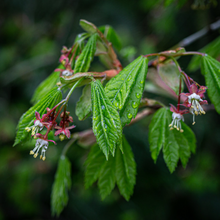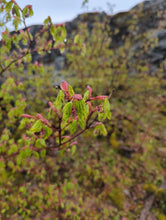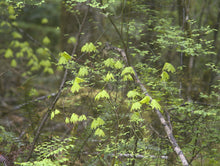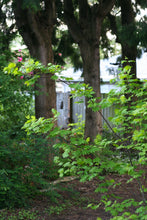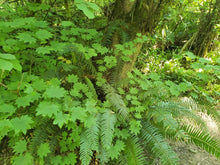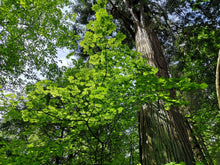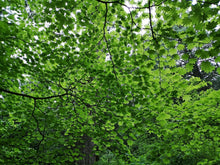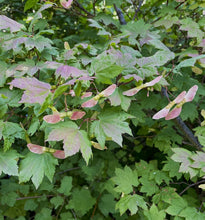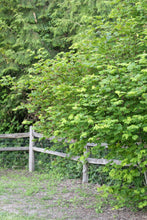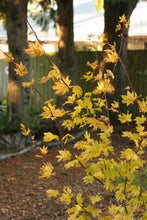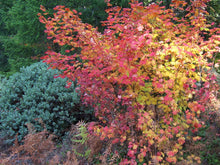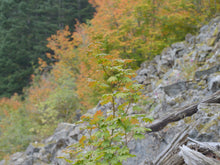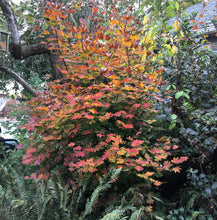
Acer circinatum
Multi-trunked vine maple is both an iconic staple of majestic Pacific Northwest forests and an enchanting element of habitat gardens. Definitely not a vine, the name is derived from its slender branches that sprawl gracefully when planted in deep shade and can root to produce new trees. It flaunts lovely verdant leaves, usually nine pointed like the number of letters in its name - a great ID trick for kids of all ages. By late summer, playful clusters of samaras adorn the leaves and, with the onset of fall, the foliage bursts into showy hues of yellow in shadier spots to brilliant red in sunnier locations.
- Plant type/canopy layer: deciduous, perennial, small tree
- Size at maturity: 20-30' tall, 15-20' wide
- Light requirements: full sun, part-sun/part-shade, full shade
- Moisture requirements: moist to seasonally wet soil, prefers well-drained
- Growth rate/ease: medium growth rate, very easy to grow
- Bloom time: March – June
- Wildlife support: spring flowers attract and provide nectar to adult butterflies, bees and other insect pollinators as well as provide food for birds and small mammals; small twigs and leaves are used by birds for nest building; summer foliage is a preferred food for deer and elk; fall seeds provide food for birds and small mammals, especially squirrels and chipmunks; overall plant provides nesting sites and cover for birds and small mammals, attracts and supports beneficial and pest eating insects and is a caterpillar host plant and larval food source for many species of native moths, including the brown tissue and Polyphemus moths
- Native range: found in moist to wet places, often in the shade of other trees, from the coast to both sides of the Cascades from Alaska to northern California. Portland Plant List - yes.
- Special features & uses: great fall color; wildlife favorite; thick branches have been traditionally used for firewood, while the thinner, flexible ones are excellent for woven baskets, snowshoe frames, and fish traps; landscape uses include erosion control, habitat hedgerows, pollinator gardens and woodland gardens
Gardening with Vine Maple: Vine maple is versatile, relatively small and very easy to grow, making it an ideal choice for all types of properties; from the smallest yards where gardeners want ample wildlife and aesthetic benefits in one punch to large restoration sites where they are planted in groupings to help control erosion. It prefers moist, well-drained soil and partially shaded habitats, often in the understory of other forest or backyard giants. In these shadier spots, it forms an open, loose shape as it spreads its branches in search of the sunlight. However, it also does great in sunnier locations, as long as adequate moisture is naturally present, where it grows into a thicker multi-stemmed tree. It also functions well as a foundation planting. Once established, it prefers no supplemental water.
Photo Credit 1: "Vine maple" by CAJC: in the PNW is licensed under CC BY-SA 2.0
Photo Credit 2 ((leafing out): © John Brew, some rights reserved (CC-BY)
Photo Credits 3 & 12 (floating leaves, on rock slide): © wweellll, some rights reserved (CC-BY)
Photo Credits 4, 9, 10 (in a habitat garden, along fence line): Karli Del Biondo, Beetles and Bees
Photo Credit 5 (in forest with sword fern): © Gavin Slater, some rights reserved (CC-BY)
Photo Credits 6 & 7 (canopy from underneath): © Jens-Christian Svenning, some rights reserved (CC-BY)
Photo Credit 8 (samaras): © Henrik Kibak, some rights reserved (CC-BY)
Photo Credit 11 (fall color in the landscape): "Acer circinatum" by Oregon State University is licensed under CC BY-SA 2.0.
Photo Credit 13: Tracy Cozine, Sparrowhawk Native Plants













